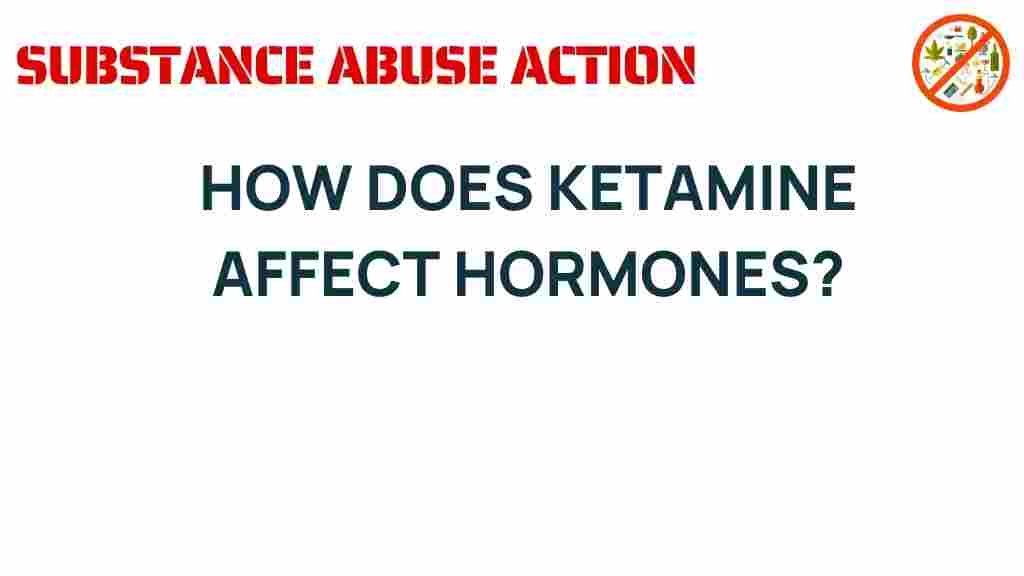Unraveling the Hormonal Impact of Ketamine Therapy
In recent years, ketamine therapy has emerged as a groundbreaking treatment for various mental health issues, including depression, anxiety, and addiction. While research has primarily focused on its efficacy as a rapid-acting antidepressant, the intricacies of how ketamine interacts with hormones in the body are becoming increasingly important in understanding its full therapeutic potential. This article aims to explore the hormonal impact of ketamine therapy, its role in mental health treatment, and how it can aid in recovery from various conditions.
Understanding Ketamine
Ketamine, originally developed as an anesthetic, has gained attention for its unique properties in treating mental health disorders. Unlike traditional antidepressants that may take weeks to show effects, ketamine can provide rapid relief from symptoms of depression and anxiety within hours of administration. This swift action makes it a valuable option for those in crisis or those who have not responded to conventional treatments.
How Ketamine Affects Hormones
The interaction between ketamine and hormonal pathways is complex. Ketamine may influence several hormones that play significant roles in mood regulation and overall mental health:
- Cortisol: Often referred to as the “stress hormone,” cortisol levels can be influenced by ketamine therapy. Research suggests that ketamine may help reduce elevated cortisol levels in patients experiencing chronic stress or depression.
- Oxytocin: Known as the “love hormone,” oxytocin is linked to social bonding and emotional regulation. Ketamine therapy may enhance oxytocin release, potentially improving mood and fostering connections with others.
- Serotonin: Ketamine is known to affect the glutamate system, which subsequently influences serotonin pathways. This can lead to increased feelings of well-being and reduced depressive symptoms.
- Dopamine: Ketamine may also alter dopamine levels, which are crucial for motivation and pleasure, making it effective in treating conditions like addiction.
The Role of Hormones in Mental Health
Hormones play a pivotal role in regulating mood, stress response, and emotional well-being. Imbalances in hormonal levels can contribute to the development and persistence of mental health disorders:
- Stress and Anxiety: Prolonged stress can lead to chronic elevations in cortisol, which may exacerbate feelings of anxiety and depression.
- Depression: Low levels of serotonin and dopamine are often associated with depressive disorders. Hormonal imbalances can disrupt neurotransmitter systems, leading to mood disorders.
- Addiction: The interplay between hormones and neurotransmitters is critical in addiction. Hormonal changes can influence cravings and withdrawal symptoms, complicating recovery.
The Step-by-Step Process of Ketamine Therapy
Ketamine therapy typically involves several steps to ensure safety and effectiveness in treating mental health issues:
- Initial Consultation: A healthcare provider will assess the patient’s mental health history and determine if ketamine therapy is appropriate.
- Medical Screening: Patients undergo a thorough medical evaluation to rule out any contraindications.
- Treatment Plan Development: A personalized treatment plan is created based on the patient’s specific needs.
- Administration of Ketamine: Ketamine can be administered via intravenous (IV) infusion, intranasal spray, or intramuscular injection, depending on the treatment center and patient preferences.
- Monitoring: Patients are monitored during and after treatment for any immediate side effects and overall response.
- Follow-Up Care: Continuous monitoring and follow-up sessions are crucial to assess progress and make necessary adjustments to the treatment plan.
Benefits of Ketamine Therapy in Mental Health Treatment
Ketamine therapy offers numerous benefits for individuals struggling with mental health issues:
- Rapid Relief: Many patients experience significant symptom relief within hours of treatment, which can be life-changing for those in crisis.
- Effective for Treatment-Resistant Conditions: Ketamine has shown effectiveness in individuals who have not responded to traditional antidepressants.
- Minimal Side Effects: When administered in controlled settings, ketamine typically has fewer side effects compared to conventional medications.
- Potential Hormonal Benefits: As discussed, ketamine may help regulate hormones that influence mood and stress, contributing to a more balanced mental state.
Challenges and Considerations
While ketamine therapy shows promise, there are challenges and considerations to keep in mind:
- Cost and Accessibility: Ketamine therapy can be expensive and may not be covered by insurance, limiting access for some patients.
- Variability in Response: Not all patients respond to ketamine therapy, and determining the right dosage and treatment schedule can take time.
- Potential for Misuse: As a substance with anesthetic properties, there is a risk of misuse, especially outside of clinical settings.
Troubleshooting Tips for Ketamine Therapy
Patients undergoing ketamine therapy may encounter challenges. Here are some troubleshooting tips:
- Communicate with Your Provider: Always keep your healthcare provider informed about any side effects or concerns during treatment.
- Maintain a Healthy Lifestyle: Incorporating a balanced diet, regular exercise, and adequate sleep can enhance the effectiveness of therapy.
- Engage in Therapy: Combining ketamine therapy with psychotherapy can provide additional support and improve outcomes.
- Stay Informed: Research and understand your treatment options. Knowledge empowers you to make informed decisions about your mental health care.
Conclusion
Ketamine therapy represents a transformative approach to treating mental health disorders, offering rapid relief and addressing complex hormonal interactions that influence mood and emotional well-being. As research continues to unravel the effects of ketamine on hormones, it becomes clear that this therapy can play a significant role in enhancing recovery from depression, anxiety, and addiction.
For those considering ketamine therapy, it is essential to consult with a qualified healthcare provider to explore this treatment’s potential benefits and challenges. With proper guidance and care, ketamine therapy can be a valuable tool in the journey toward mental health recovery. For more information about mental health treatments, visit Mental Health America.
As you navigate your recovery journey, remember that mental health is a multifaceted issue, and finding the right combination of therapies and support is crucial. If you would like to learn more about various mental health treatments, feel free to check out our comprehensive guide on effective therapies.
This article is in the category Treatment and created by SubstanceAbuseAction Team
